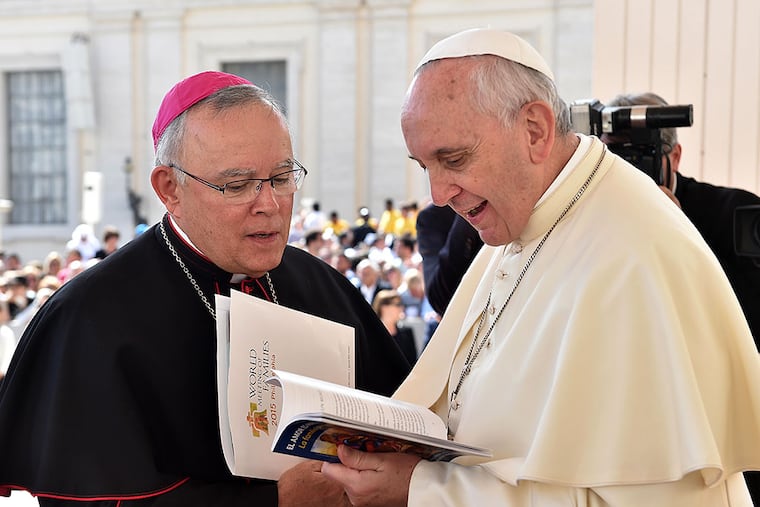A message Philly needs to hear
Next September, Philadelphia will host Pope Francis, who will be visiting as part of the World Meeting of Families. Given the immense global impact Francis has had in his still young papacy, this is a historic opportunity for our city: More than two million visitors are expected, and for several days the eyes of the world will be upon us.

Next September, Philadelphia will host Pope Francis, who will be visiting as part of the World Meeting of Families. Given the immense global impact Francis has had in his still young papacy, this is a historic opportunity for our city: More than two million visitors are expected, and for several days the eyes of the world will be upon us.
This dynamic new pope has seized the imagination of millions around the globe - Catholic and non-Catholic alike. This is in large part because he has spoken out so forcibly about those who are poor and suffering. "The times talk to us of so much poverty in the world, and this is a scandal," he has said. "In a world where there is so much wealth, so many resources to feed everyone, it is unfathomable that there are so many hungry children, that there are so many children without an education, so many poor persons. Poverty today is a cry."
In the depths of our humanity, all of us hear this cry, and it calls forth from us our truest selves. Pope Francis has given us a gift, by urging us to refocus on the truth of poverty and struggle in our world, both in its global and local forms. He is inviting us to tap the wellsprings of compassion and goodness within us, and he is urging us to reenvision our societies along the lines of justice and human dignity.
This is a message that Philadelphia needs to hear. Our city has a poverty rate of 26 percent - the highest among the 10 largest cities nationwide. Almost one of every three children in Philadelphia lives in poverty. Thousands experience homelessness. Food pantries and soup kitchens are strained to meet the growing needs of people facing food insecurity. As Pope Francis says, a scandal indeed.
This week we will pause and reflect on the sobering reality of those who experienced homelessness and passed away this year. On Thursday at 5 p.m., hundreds of people will gather at Dilworth Park for Homeless Memorial Day. This annual commemoration is held in conjunction with similar events in more than 150 cities around the country.
Along with prayer, song, and poetry, we will read the names of more than 130 persons. Many of them were homeless at the time of their death, some even dying on the streets or in abandoned homes. Many had succeeded in breaking the cycle of homelessness, demonstrating the power of hope and transformation.
Their lives and their deaths remind us of the ongoing crises of poverty and addiction; the lack of health care, affordable housing, and economic opportunity; and the many ways our society dehumanizes those on the margins. They also remind us that we have solutions, and that homelessness and poverty do not have to be intractable problems. In the midst of the holiday season, we will honor all of them during the service - most of all, by recommitting ourselves to working to end homelessness.
Over the next nine months, many people of faith and conscience in our region will be organizing events to raise awareness of the issues of hunger, homelessness, and poverty in anticipation of the pope's visit. We will create venues for the voices and stories of those who are economically struggling. We plan on reaching out to our schools and our faith communities to create deeper understanding of the issues and opportunities to respond.
We will be inviting all members of our community to envision how the pope's visit can spark new opportunities for services and programs to those in need and new resources for effective solutions of housing, education, health care, employment, and income supports. Even for a few days, the pope's presence here can engender deeper impulses of charity and broader support for public policies that foster true social and economic justice.
Pope Francis has said, "The measure of the greatness of a society is found in the way it treats those most in need, those who have nothing apart from their poverty."
He will undoubtedly reiterate that message next fall here in Philadelphia - a message that echoes deep in our own historical origins, as a community founded to be a "city of brotherly love and sisterly affection." We hope our city, our region, and our nation will hear Pope Francis' message, and we will respond to the invitation to true greatness - a greatness rooted in human dignity, compassion, and justice.